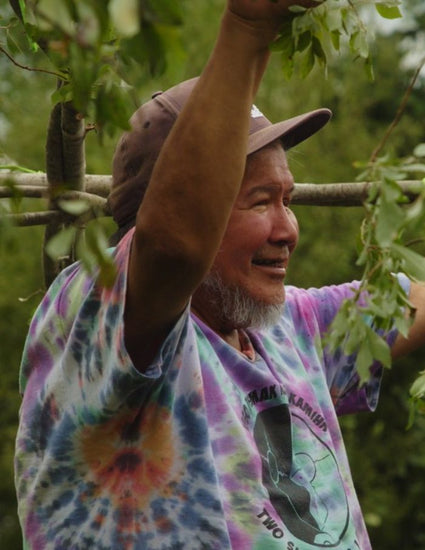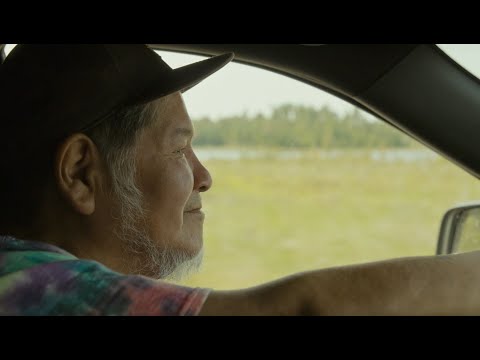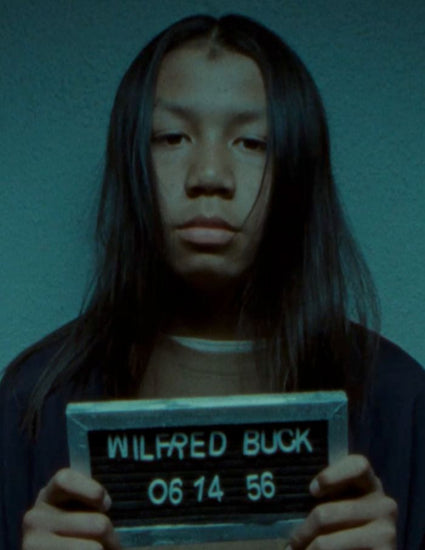Wilfred Buck
Director
Lisa JacksonProducers
Lisa Jackson Lauren Grant Alicia Smith (NFB)Subjects
Canadian History Colonialism Cree Environment First Nations Indigenous Science Spirituality- Release Date 2024
- Running Time 96 minutes / 52 minutes
- Closed Captions Yes
- Availability USA
- Regular price
- $350.00
- Regular price
-
- Sale price
- $350.00
- Unit price
- per
License Definitions
License Definitions
Institutions: Purchase at this price level if you are from a university, college, school board, school district, government agency, business or association. Note: Price does not include inter-library loan rights.
Community: Purchase at this price level if you are from a single K-12 School, registered not-for-profit, community organization, public library. Note: Price does not include right to circulate DVD/program to other schools within district.
DSL Terms
DSL Terms
DSL stands for Digital Site License and permits the buyer of the license (or Licensee) to host the film on a private, password-protected, closed server for the term of the license for educational use. If your institution does not have a server or a private third party hosting platform or you are looking into a license for curated one-time events or fixed term exhibitions, please contact us.
See below for more information about DSL terms of use. Upon order placement, our staff will contact you within 3 business days to arrange digital file delivery.
Book a Screening
Book a Screening
Couldn't load pickup availability
Share



"Wilfred Buck" is a powerful hybrid documentary from award-winning Anishinaabe filmmaker Lisa Jackson, known for her bold, genre-crossing work. The film tells the extraordinary true story of Cree Elder Wilfred Buck—charismatic, irreverent and deeply wise—who overcame racism, displacement and addiction by reclaiming Indigenous star knowledge and ceremony.
Moving between past and present, earth and sky, this visually striking film blends memoir, verité, archival footage and re-enactments to explore Buck's life journey and the survival of Indigenous knowledge systems in face of colonization. Based on his memoir "I Have Lived Four Lives", the film asks: What is lost when ceremony disappears—and what can be healed when it returns?
"Wilfred Buck" is both intimate and cosmic—a call to remember the sacred, to reconnect with ancestral teachings and to embrace Indigenous science and cosmology as a way of understanding our place in the universe.
English, with English captions
Versions available dubbed in Cree and dubbed in French
A Door Number 3 Productions film in coproduction with the National Film Board of Canada
Director: Lisa Jackson
Producers: Lisa Jackson, Lauren Grant, Alicia Smith (NFB)
Executive Producers: Jennifer Baichwal, Nicholas de Pencier, David Christensen (NFB)
Associate Producer: Brittany Ryan
Canadian Distributor: National Film Board of Canada
United States Distributor: Moving Images Distribution
International Distributor: Filmotor
Buy Wilfred’s book Kitcikisik (Great Sky): Tellings that Fill the Night Sky
Buy Wilfred’s memoir I Have Lived Four Lives
=====
Related to this documentary is a sister project, "Wilfred Buck's Star Stories" a 21 minute immersive dome experience that brings to life four star stories through spectacular night sky cinematography and cosmic visualizations. Presented in planetariums and XR environments, the piece expands on Buck's teachings by offering a rarely heard Indigenous knowledge on astronomy and our enduring connections to the cosmos.
Director’s Statement
I guess you could say it started with sturgeon. It was the summer of 2017. I was reading an article when I saw the word “sturgeon” and experienced what I’ve come to call a zap. (These happen rarely, every few years, like a bolt of fascination and urgency. I’ve learned to listen to them, as my most successful projects have started this way.) I’d heard of this ancient fish before, but it had never had this effect on me. A seed was planted…
Later that year, when a friend asked me to attend a panel on Indigenous star knowledge at the University of Toronto, I went. When a man from the Canada Science and Technology Museum mentioned the name “Wilfred Buck,” again, zap. I raced up to the presenter during the break: “Someone has to make a film on Wilfred Buck!”
When Wilfred and I spoke on the phone some weeks later, he told me he’d just finished writing his life story and that no one knew he’d written it except his wife and daughter. He said he’d email it to me. Later that day, I read the first page of his memoir, "I Have Lived Four Lives:"
I am Pawami niki titi cikiw, “He has Dreamed a Dream and Keeps it,” shortened to “Dream Keeper.”
What you are about to picture here is the artist painting a clean, biased, slightly sullied version of a truer reality. I put the best me on display. I crawl out of the darkness, into the light.
I am of the fresh-out-out-of-the-bush, partly civilized, colonized, displaced people. Trained and shamed by teachers, preachers, doctors, nurses, law enforcement, movie, radio and television to be a pill-popping, hard drinking, self-loathing, easily impressed, angry, nonconformist, maladjusted, disaffected youth of the “dirty-indian,” baby boomer generation.
By all rights, I am told, I should be dead six times over.
So here is the story of how I lived and how I died and how I lived again along with the dreams I have dreamed.
I was riveted. Seamlessly moving from past to present, heartbreaking to hilarious, it was searingly honest, playful and wise. Here was a beat poet, born on the land, torn from it and thrown into a society that said his people were backwards, knew nothing, and that his ancestors were in Hell. Like many others, he fell into a deep hole of addictions, street life and pain, hurting others as he had been hurt.
It was the story of colonialism, told from the inside. And not just the colonization of people and territory, but of the mind and spirit. Reading Wilfred’s words, I saw someone who’d been through the fire of what has broken countless Indigenous people, and survived. And who was now, with the help of his family and community, forging a path for others to heal and reconnect to the profound teachings of their ancestors through ceremony and star knowledge. In the film, we see 30-year-old archival footage of Wilfred on the Canadian Broadcasting Corporation’s beloved science series The Nature of Things, already on this path:
We have to go back to the teachings of our ancestors, and we have to understand what they mean. Not just verbally, but also inside our spirit. What that actually means. It gives you a sense of belonging, and once you have a sense of belonging, you know you’re part of something. And that part of something is your responsibility—not to try to destroy that. Our Elders tell us that all things are sacred, life is sacred.
On the last page of Wilfred’s memoir is the story of Namew, the sturgeon. This Cree star constellation reminds us of the responsibilities of seven generations and beyond; that we are part of the continuity of knowledge through time, ensuring that the next generations have what they need to live a good life. The sturgeon is a long-lived fish that swam with the dinosaurs, a fish that has endured extinction events. It swims low in the rivers and lakes and carries lessons. Some say it can move between the worlds, above and below. Reading that, I knew I would be the filmmaker to make this film.
Colonization has taken a hatchet to the chain of knowledge our ancestors carried forward, but it didn’t sever it. And through the work of Wilfred and countless other Elders, knowledge keepers, teachers and oskapiwis (helpers), the knowledge is being transmitted again—no longer outlawed, ridiculed and diminished.
And while the film conveys Ininew (Cree) teachings, Indigenous teachings, there is much for anyone to learn about how to heal and how to come to new knowledge. What does it mean to open your mind, to not hive off “knowledge” as purely rational, separate from our lived experience, from the heart and spirit? Indigenous knowledge is based on millennia-long observations of the Earth and skies that provided guidance on how to navigate and live in balance. In a world drowning in data and information, we are starved for wisdom and perspective. The film asks us to ponder the question: What is missing when there is no ceremony?
When I set out to make this film, I thought I’d encounter a dialogue between Western and Indigenous perspectives on the stars and science. But what I found was that Western knowledge and Indigenous knowledge have only just introduced themselves. And though there is a growing recognition of TEK (or Traditional Ecological Knowledge), the mainstream categorization of rational thought and quantifiable data as completely separate from other ways of knowing is a barrier. There may be a willingness to listen, but there remains a gulf in language and worldviews. I hope this film can be an invitation for that dialogue to begin.
If your institution does not have a server or you are looking into a license for curated one-time events or fixed term exhibitions, please contact us.
Digital Site License (DSL) to Use Copyrighted Material - Terms of Use
The following terms are understood, accepted and effective upon payment of License Fee to Moving Images Distribution, the Licensor, and the buyer, the Licensee, named on the invoice. Copyrighted material, as identified on the invoice, hereinafter referred to as the Program.
- License: The Licensor hereby grants to the Licensee, for the DSL term listed on the invoice, the educational rights for digital streaming of the Program for use within the Licensee’s private, closed system, password-protected platform. Licensee acknowledges it shall not sublicense, sublease, rent, resell, duplicate, digitize or transfer to any other medium or format. Licensee shall not edit, cut or alter the Program nor post it on publicly-accessible websites or networks. This license (i) will not be included in any courses that could be sold to other institutions for future distance-education use; (ii) is non-transferable; and (iii) is not assignable by the Licensee.
- Users: The Licensee agrees that the users for this license shall be restricted to the Licensee’s accredited faculty, staff, students, and walk-in Library patrons.
- Expiration of Term: Upon expiration of the license term, the Licensee shall cease streaming of the Program and the Program must be inaccessible to Users after license term expiry or deleted from the Licensee’s digital servers upon expiry.
Acknowledgement of Limitations: The Licensee acknowledges the Program is copyrighted and the Licensor has a copyright interest in the Program which is legally protected against the Licensee’s use, copying or exhibition except as is set out above.
DVD w/PPR. PPR stands for Public Performance Rights. A DVD with PPR license permits the buyer to use the film in non-theatrical venues for educational purposes, community screenings and other non-commercial purposes. Standard educational DVD w/PPR purchases are in perpetuity for use by the institution, college, school, library, its staff and students.
All DVDs sales are final. We guarantee that all DVDs will be free from defects at the time of delivery. Defective DVDs will be replaced without charge within 30 days of date of shipment.
The creators of all works distributed by Moving Images Distribution hold copyright for their work. Copyrights are a form of intellectual property that gives the owner of the original work exclusive rights to that work, including its publication, distribution, adaptation and use. All purchasers are to specify use required precisely at time of ordering and agree to comply with all copyright, trademark and intellectual property law. No materials purchased may be used outside the rights acquired at time of purchase or may be reproduced in whole or in part by any method now known or hereafter devised. No materials purchased without specific broadcast license and agreement may be broadcast, retransmitted or exhibited in whole or in part without a specific license agreement from Moving Images Distribution for such use.








